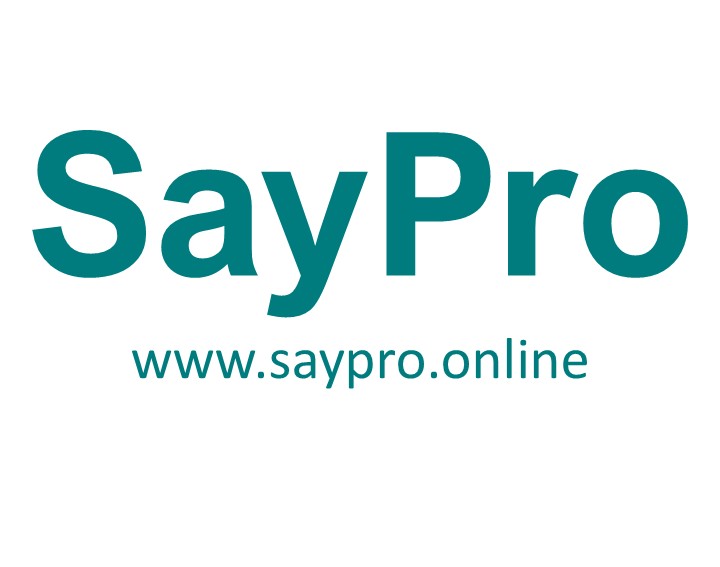SayPro Monthly January SCMR-5 SayPro Monthly Classified Support Tickets: Implement a support ticket system for user inquiries by SayPro Classified Office under SayPro Marketing Royalty SCMR
Objective:
The goal is to establish a comprehensive, ongoing process of continuous improvement to enhance the overall user experience, streamline support, and maintain up-to-date resources for SayPro’s classified software. This will be achieved through two key components: Knowledge Base Updates and Support Ticket System Implementation.
1. Knowledge Base Updates
Overview:
The SayPro Knowledge Base will be continuously updated to reflect the most common support issues raised by users. These updates will not only address frequently asked questions but will also provide solutions, troubleshooting steps, and step-by-step guides to ensure users can resolve issues efficiently without needing direct support.
Key Tasks:
- Monitoring and Analysis:
- Monitor the SayPro Monthly Classified Support Tickets (SCMR-5) to identify common issues, trends, and recurring problems faced by users.
- Regularly analyze the content of user inquiries and support requests to determine new topics for inclusion in the knowledge base.
- Keep track of updates in the classified software, tools, and integrations that may require documentation revisions or additions.
- Content Creation and Updates:
- For every new recurring issue identified, create detailed, easy-to-understand articles that provide actionable solutions or troubleshooting steps.
- Ensure that each knowledge base article is optimized for search, with clear titles, tags, and categorization.
- Provide visual aids (e.g., screenshots, videos, flowcharts) to enhance understanding of complex procedures.
- Regularly revise existing articles to reflect new updates, fixes, or software features.
- Integration with User Feedback:
- Allow users to rate articles for helpfulness, and use this feedback to improve and refine the content.
- Include a feedback form at the end of each knowledge base article to collect insights on how well the solution worked and suggestions for improvement.
- Internal Team Collaboration:
- Work closely with the SayPro technical support and development teams to ensure all updates, bug fixes, and new features are accurately reflected in the knowledge base.
- Collaborate with the marketing team to ensure that user-facing content aligns with SayPro’s branding and communication strategies.
- Quarterly Review:
- Conduct quarterly reviews of the knowledge base to identify outdated information, gaps in coverage, or content that can be improved.
- Adjust the frequency of updates based on user activity and the emergence of new support trends.
Deliverables:
- Regular updates to the knowledge base.
- A growing repository of articles covering common support issues, system features, and best practices.
2. Support Ticket System Implementation
Overview:
Implement a structured, easy-to-use support ticket system under the SayPro Marketing Royalty SCMR initiative for user inquiries and issues. This system will serve as a central hub for tracking, managing, and resolving user concerns efficiently.
Key Tasks:
- System Selection and Customization:
- Choose a ticketing system that integrates well with existing SayPro software and tools. Options could include platforms like Zendesk, Freshdesk, or an in-house solution.
- Customize the ticketing system to align with the SayPro Classified Office’s needs, incorporating workflows, ticket categories, user priority levels, and automated responses.
- Ticket Categorization and Workflow:
- Develop a clear ticket categorization system to ensure efficient routing and faster response times. Categories may include:
- Technical Support
- Billing and Payment Issues
- Software Feature Requests
- General Inquiries
- Define workflow processes for handling tickets, from submission through to resolution and closure. This will ensure all inquiries are properly triaged, assigned to the right team members, and tracked.
- Develop a clear ticket categorization system to ensure efficient routing and faster response times. Categories may include:
- User Interaction and Support Channels:
- Enable multiple user interaction channels for ticket submission, including email, a user portal, and live chat options.
- Ensure that users receive automatic acknowledgment when a ticket is submitted, along with an estimated resolution timeline.
- Implement a ticket tracking system where users can view the status of their inquiry and communicate with support agents.
- Response and Resolution SLAs (Service Level Agreements):
- Establish clear SLAs for ticket response and resolution times based on ticket priority.
- Regularly evaluate performance against these SLAs to ensure timely support.
- Integration with Knowledge Base:
- Incorporate knowledge base articles directly into the support ticket system to guide users to potential solutions before they submit a ticket.
- Automatically suggest relevant knowledge base articles based on ticket content or user queries, minimizing the need for direct support.
- Reporting and Analytics:
- Generate monthly reports on ticket volume, common issues, average response and resolution times, and user satisfaction levels.
- Analyze this data to identify areas for improvement, both in terms of the support process and the knowledge base content.
- Track recurring issues to further refine the knowledge base and preemptively address problems.
- Training and Documentation for Support Agents:
- Provide training to support agents on the new ticketing system, including how to categorize tickets, prioritize inquiries, and provide effective resolutions.
- Create an internal manual outlining the procedures for using the ticket system, including how to escalate issues that require higher-level intervention.
- User Education and Awareness:
- Promote the ticketing system through email newsletters, the SayPro website, and within the classified software dashboard to ensure users are aware of its existence and how to use it.
- Include instructions on how users can create, track, and manage their support tickets effectively.
Deliverables:
- Fully implemented and customized support ticket system.
- Monthly performance reports on ticket system metrics (volume, resolution time, satisfaction).
- Regular updates to ticketing procedures and workflows based on feedback and analytics.
Conclusion:
By continuously updating the knowledge base and implementing a robust support ticket system, SayPro will ensure a smoother, more efficient experience for its users. This continuous improvement approach will not only resolve issues more effectively but also empower users to find solutions independently, enhancing customer satisfaction and reducing reliance on direct support.

